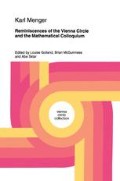Abstract
Schlick's personal relations with the author of the Tractatus began in 1927. From the outset Schlick was greatly impressed by Wittgenstein and deeply regretted his having given up work in philosophy. In this connection, I remember a party sometime after Schlick had returned from England.1 The conversation turned to some philospher or scientist who had stopped working and someone brought up Wittgenstein. “There is a great difference, though,” said Schlick. “Mr. (whoever it was) ceased working because of fatigue, whereas Wittgenstein has given up work because of ressentiment.” I remember Schlick using the French word, which incidentally has no precise German counterpart and, in a way, is slightly stronger than the English ‘resentment.’ (“Souvenir d‘une injure, désir de s‘en ve-nger,” explains Larousse and adds the example “conserver le vif ressentiment d‘une offense.”) At this point, the conversation unfortunately was interrupted by someone’s joining the group and was not resumed despite the questions it raised in my mind. Then and later various signs seemed to me to point to Wittgenstein’s particular resentment against mathematicians. Schlick’s awareness of this fact may have been one of the reasons why, in 1927, he introduced Carnap, Feigl, and Waismann (who was by then definitely a philosopher rather than a mathematician) to Wittgenstein while keeping mathematicians away from him.
Preview
Unable to display preview. Download preview PDF.
Notes
[This visit took place in October 1927. B. McG. ]
The Autobiography of Bertrand Russell 1914-1944, pp. 292f.
Friedrich Waismann, Wittgenstein und der Wiener Kreis. ed. B. F. McGuinness, Oxford 1967 (E.T. Wittgenstein and the Vienna Circle, Oxford 1979) p. 71.
Actually, the number a is comparable to all rational numbers with the single exception of the number 0. But is is easy to define numbers that are incomparable to all rational numbers or to all rational numbers of an interval.
Arend Heyting, Intuitionism An Introduction, (Amsterdam, 1956) p. 27.
Waismann, op. cit. p. 188
Ludwig Wittgenstein, Philosophische Bemerkungen Frankfurt, 1964 and Philosophical Remarks Oxford, 1975. [The translations from Wittgenstein in the present chapter are Menger’s own. B. McG.]
lbid., p. 288
lbid.
Ludwig Wittgenstein, Philosophische Grammatik. Frankfurt, 1969 and Philosophical Grammar. Oxford, 1974.
[See Karl Menger, ‘Intuitionism’, in Selected Papers, for a fuller history of intuitionism and its relation to more traditional views of mathematics. L. G.]
Editor information
Editors and Affiliations
Rights and permissions
Copyright information
© 1994 Springer Science+Business Media Dordrecht
About this chapter
Cite this chapter
Menger, K. (1994). Wittgenstein, Brouwer, and the Circle. In: Golland, L., McGuinness, B., Sklar, A. (eds) Reminiscences of the Vienna Circle and the Mathematical Colloquium. Vienna Circle Collection, vol 20. Springer, Dordrecht. https://doi.org/10.1007/978-94-011-1102-7_10
Download citation
DOI: https://doi.org/10.1007/978-94-011-1102-7_10
Publisher Name: Springer, Dordrecht
Print ISBN: 978-0-7923-2873-5
Online ISBN: 978-94-011-1102-7
eBook Packages: Springer Book Archive

